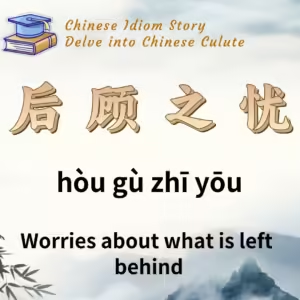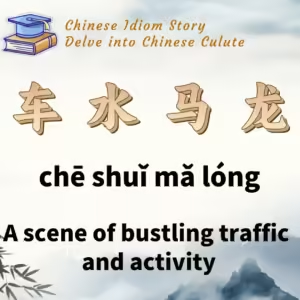
Chinese Idiom: 晨钟暮鼓 (Chen Zhong Mu Gu)
English Translation: Morning bell and evening drum
pīn yīn: chén zhōng mù gǔ
Idiom Meaning: Originally refers to the solitary life of monks and nuns; it also symbolizes words or teachings that awaken reflection and insight.
Historical Source: From Du Fu’s poem 游龙门奉先寺 (Visiting the Fengxian Temple at Longmen) during the Tang Dynasty.
Idiom Story:
Longmen, located over twenty miles south of Luoyang, is famous for the Longmen Grottoes, a treasure of Buddhist art. The carving of the grottoes began in the Northern Wei dynasty under Emperor Xiaowen and was expanded and renovated over the years. By the Song Dynasty, nearly 100,000 Buddha statues had been carved along the one-kilometer cliff of Longmen.
Among these, the earliest cave is “Ancient Yang Cave,” while the largest and most artistically accomplished is “Fengxian Temple.” Fengxian Temple, constructed during the early Tang Dynasty around AD 660, was completed in AD 675. It is said that Empress Wu Zetian donated 20,000 coins for its construction. The main statue enshrined in the temple is the Luohan Buddha, which stands at 17 meters tall, with its ears larger than those of an average person.
In the early years of the reign of Emperor Xuanzong (Tianbao era), the poet Du Fu visited Longmen and spent a night at Fengxian Temple, where he composed a five-character poem titled 游龙门奉先寺. The poem reads:
已从招提游,更宿招提境。
阴壑生虚簌,月林散清影。
天阙象纬逼,云卧衣裳冷。
欲觉闻晨钟,令人发深省。
The meaning of the poem is as follows: During the day, I explored the temple with the monks, and at night I stayed in the temple. The dim valleys are silent, and the bright moonlight casts long shadows in the woods. Staying in this high mountain temple feels like being close to the stars in the Milky Way, sleeping among the clouds with a chill in the air. Before dawn, the morning bell rings, prompting deep reflections and realizations in this extraordinary night.
Later, the phrase “欲觉闻晨钟,令人发深省” (Hearing the morning bell prompts deep reflection) was simplified and generalized into the idiom “晨钟暮鼓,” symbolizing the sounds that inspire contemplation and awaken the mind.






